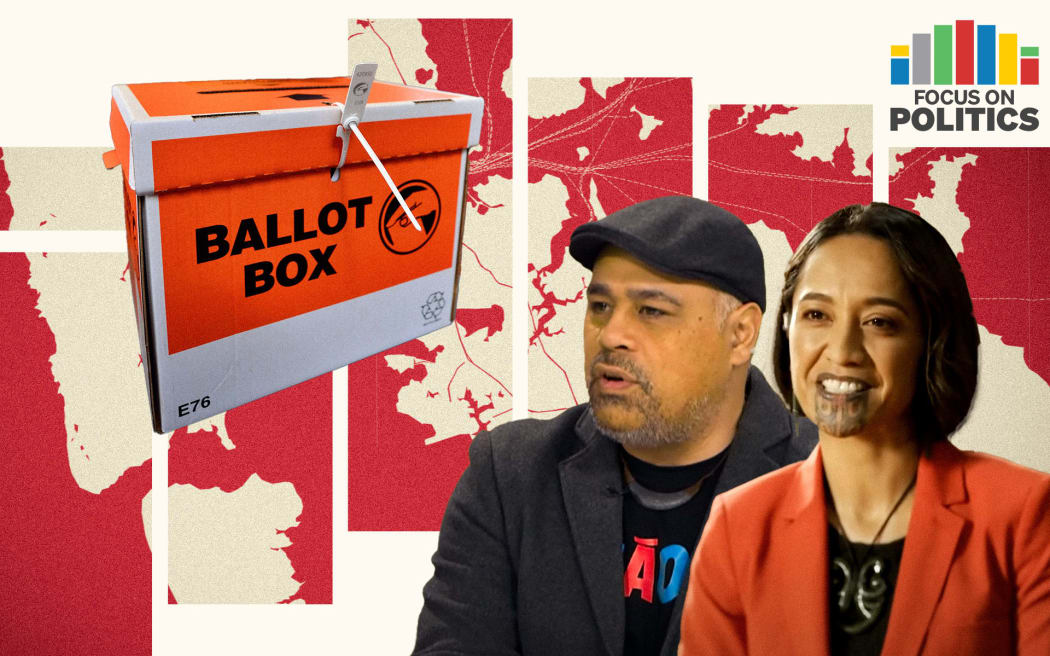Politics
Labour and Te Pāti Māori Clash in Tāmaki Makaurau By-Election

The by-election for the Tāmaki Makaurau electorate has emerged as a crucial contest between Labour’s Peeni Henare, a former Cabinet Minister, and Oriini Kaipara, a first-time candidate representing Te Pāti Māori. With less than a week until voting concludes, the race has intensified, highlighting a choice between a seasoned politician and a newcomer supported by a revitalized party. Voter sentiment is sharply focused on the question of which approach resonates more with Māori: the established political framework or a challenge to the status quo.
Situated from the Waitākere Ranges to Bucklands Beach, the Tāmaki Makaurau electorate encompasses a diverse range of communities, including most of Auckland’s southern and eastern suburbs as well as Waiheke Island. Notably, it has the highest average annual household income among Māori electorates, at nearly $130,000, yet it also has the most individuals relying on jobseeker benefits. As of late July, there were close to 44,000 enrolled voters in the electorate, with nearly half under the age of 40.
While Henare and Kaipara are the frontrunners, the ballot also features candidates such as Kelvyn Alp from New Zealand Loyal and independent candidate Sherry Lee Matene. The significance of this by-election is underscored by the fact that in the previous election, both Labour and Te Pāti Māori candidates garnered over 10,000 votes each, accounting for approximately 80 percent of the total votes cast.
Political Landscape and Historical Context
In the 2023 election, Labour suffered significant losses, retaining only one Māori electorate. Henare himself lost the Tāmaki Makaurau seat to Te Pāti Māori’s Takutai Tarsh Kemp by a mere 42 votes following a recount. Since then, Te Pāti Māori has gained momentum, amplifying its voice through movements like the one that brought thousands to Parliament under the Toitū te Tiriti banner in opposition to the Treaty Principles Bill.
This by-election serves as a vital indicator of Labour’s efforts to reclaim Māori support ahead of the general election, as both candidates aim to showcase their unique strengths. Henare, who has been an MP since 2014 and previously held the Tāmaki Makaurau seat, contrasts sharply with Kaipara, who has no prior political experience. The historical connection between the two parties adds another layer to this contest; Te Pāti Māori was founded partly in response to perceived betrayals by Labour, particularly surrounding the controversial Foreshore and Seabed legislation.
Despite the competitive nature of the race, the candidates have maintained a respectful and cordial atmosphere throughout their campaigns. Henare remarked, “We have one enemy here and it’s this government,” emphasizing a focus on the broader issues rather than personal attacks. Kaipara echoed this sentiment, stating, “Everybody is screaming for this government to get out.”
Key Issues and Voter Concerns
As both candidates engage with the electorate, the cost of living has emerged as a primary concern among voters. Henare highlighted that many constituents are anxious about job security, healthcare access, and housing stability. “A lot of them do not know whether or not they’ll have a job by the end of the month,” he noted, illustrating the urgency of these issues.
Kaipara is also resonating with voters, particularly younger demographics, by positioning herself as a voice for those disillusioned by mainstream politics. She asserts that Te Pāti Māori is uniquely equipped to address the challenges faced by Māori communities. “It is the only party that pushes 100 percent and beyond for Māori outcomes, Māori solutions, and Māori funding,” she stated.
Feedback from voters indicates a division in loyalty based on familial ties and perceived effectiveness. While some students at the Te Pūtahi Māori o Manurewa campus expressed a preference for Labour, citing historical support, others are drawn to Te Pāti Māori’s boundary-pushing approach, particularly regarding cultural representation in Parliament.
Henare, while acknowledging the challenges faced by Labour, expressed confidence in the party’s ability to resonate with Māori voters. “I have got a proud track record of delivering for whānau here in Tāmaki Makaurau. I have done it before, and I know I can do it again,” he contended.
Kaipara, in response, emphasized her genuine commitment to the community, stating, “I like to push boundaries to inspire other people.” Both candidates recognize the importance of this by-election as a reflection of Māori political sentiment and direction leading into future electoral contests.
As the by-election approaches, the Tāmaki Makaurau race serves not only as a battleground for political ideologies but also as a litmus test for the broader aspirations of Māori voters within New Zealand’s political landscape. The outcome will likely provide significant insights into the evolving relationship between Māori communities and the major political parties in the lead-up to the next general election.
-

 World1 week ago
World1 week agoPrivate Funeral Held for Dean Field and His Three Children
-

 Top Stories2 weeks ago
Top Stories2 weeks agoFuneral Planned for Field Siblings After Tragic House Fire
-

 Sports3 months ago
Sports3 months agoNetball New Zealand Stands Down Dame Noeline Taurua for Series
-

 Entertainment3 months ago
Entertainment3 months agoTributes Pour In for Lachlan Rofe, Reality Star, Dead at 47
-

 Entertainment2 months ago
Entertainment2 months agoNew ‘Maverick’ Chaser Joins Beat the Chasers Season Finale
-

 Sports3 months ago
Sports3 months agoSilver Ferns Legend Laura Langman Criticizes Team’s Attitude
-

 Sports1 month ago
Sports1 month agoEli Katoa Rushed to Hospital After Sideline Incident During Match
-

 World2 weeks ago
World2 weeks agoInvestigation Underway in Tragic Sanson House Fire Involving Family
-

 Politics2 months ago
Politics2 months agoNetball NZ Calls for Respect Amid Dame Taurua’s Standoff
-

 Top Stories2 weeks ago
Top Stories2 weeks agoShock and Grief Follow Tragic Family Deaths in New Zealand
-

 Entertainment3 months ago
Entertainment3 months agoKhloe Kardashian Embraces Innovative Stem Cell Therapy in Mexico
-

 World4 months ago
World4 months agoPolice Arrest Multiple Individuals During Funeral for Zain Taikato-Fox

















